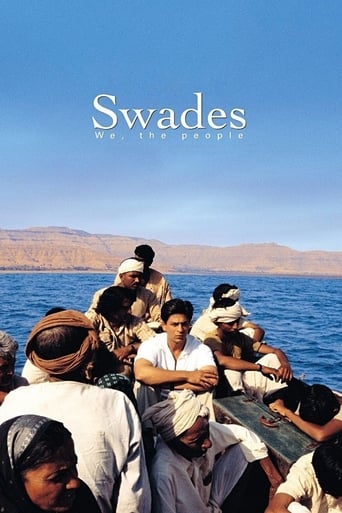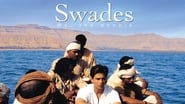wvriend
A feel good movie about the beauty of India's rural areas and diversity of its people. The movie preaches equality and gentle progression as it says in the English title: we, the people. This message is portrait through a Nasa manager who goes back to visit his nanny and finds love and truth on his way. The experiences he collects during his stay are shown without false sentiments but with the lighthearted spirit one recognizes from Bollywood. Of course with chanting, dancing, a small tear and lots of humor. Enjoy the sympathetic characters and a lost three hour visit to rural India.
ashprofessionalways
Early on we find Mohan addressing the press in NASA about cities his initiative would have an impact on. He goes about, " San Francisco, Latin Mexico, New Delhi..." , dispassionately. Delhi doesn't resonate ethnic familiarity. It's another piece of geography. A mere statistic. He's as Indian as a Mira Nair movie. The very mention of India in a press conference- after returning from a trip there - towards the film's closure, unsettles him. It's no mere "another" country anymore. It's his; he its. It's the pin that made contact with his carefully cultivated American bubble. Swades is book-ended by these two press conferences. It's the story of a man's search for his mother, that ends in his motherland. It traces an individual's metamorphosis from being a condescending first world citizen to someone crushed by the stench of third world reality, which was easier to digest as editorial observations over English breakfast.Where do I start? Do I talk about the audacity of the role reversal employed, where the leading lady is chivalrously let to tie dhoti to an almost emasculated hero; who's regarded as a deity of fluffy romance in the country's heartlands. Or do I talk about the spectacle, simple thoughts are translated into on screen like the "Yeh Tara, Woh Tara" song sequence. Just a few nimble limb movements here, a few facial sparkles there. A song with stars as metaphors under a night sky sprinkled with glittering stars, rendered by a nimbus star in an ominous form. It's as transcendental as poetry gets on the big screen.Neither the obscene budgets nor the more obscene promotions(hawking) of these days were there to flex, but he was nonchalantly wearing his superstardom like a good perfume. His charm was organic, not labored. If Khan's the film's face and heart, Rahman's music is the pulse and soul. Rarely do we get a musical score that follows the story like a solicitous shadow, never once intending to precede or side step for attention. It grows with the protagonist; melting with him; simmering with him; hoping with him and hurting with him. It fashions the western finesse to the eastern sensibilities of the film's milieu. Swades is a fine example of what happens in a legitimate marriage between the song and dance trope and narrative dexterity.And a special mention, actually a very special mention to Gayatri Joshi. The deadpan way in which she competes with SRK's calculator, her implosive consent to his boisterous overtures, her outbursts of child ego while being possessive of Kaveriamma or the dollops of grace she adds to the chiffon saris. She brings so much dignity to Geeta, doing more to the role than it does to her. Not often do we get an actress who makes us feel guilty in a wet dream.Mohan's starting to scratch beyond the surface of paper patriotism, when Kaveriamma sends him to collect rent arrears from a farmer. To him it's just an expedition, another rustic journey to a rudimentary hamlet . But she knows more. She knows it would make him go off the deep end on a journey of self discovery. On his way there he travels on a boat, standing with a glint of amusement in his eyes, distant from the other modest passengers. He doesn't disrespect them. He just doesn't belong.He meets the farmer, through him meets with every ugly truth inundating a nation- poverty, casteism, apathy - he only knew of at an ethnicity and number-of-rivers basis till now.He came to India with first world problems like guilt from not being able to stay in touch with his foster mother. His project in NASA addressing the issue of global water scarcity that hitherto swelled his chest slowly fades away to in-prominence as he gazes skywards, from the ground reality of a third world peasant's backyard. A young boy sprinting helter skelter, to sell water for 25 paise adds further salt to his wounded soul. On his way back, he returns a different man on the same boat. He's humbled by the guilt of ignorance about a country he claimed to be a part of; humbled by the knowledge that the "humble" lives led in its heartlands was in fact euphemism to the collective sufferings. Legs folded, he's seated among the other modest beings on the boat. The distance between them had crumbled. In fact it now feels like a crime. "They" becomes "we", as he becomes Indian.
warule_mahesh
This is Ashutosh Gowarikar's best movie so far no doubt about this some may be argue that Lagaan & Jodha Akbar are his best movie but for me this is the one. I watched this movie in 2004 at theater with handful of people as 90% hall was empty.Even though its Shahrukh khan movie it was flop movie at that time. It is not necessary always that flop movie is not good movie.in this Shahrukh plays very simple role of NASA scientist which is against his lover boy image. He looks very mature & he underplayed his role. Gayatri joshi, the heroine of the movie matches him well as she performed brilliantly.These is only movie in her career. But the main aim of the movie is country needs more skillful people who can contribute to their own country instead of working in other countries. All characters in the movie played their role brilliantly, The music of the movie is very good because of AR Rahman. I love this movie for two people, first is Shahrukh Khan & Second is director Ashutosh Gowarikar. These is their best work. Watch these movie For these two.


